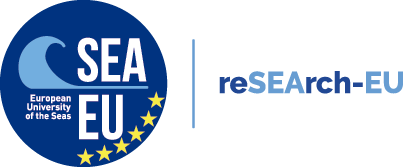Last 1 December, the first version of the Guiding Principles for the SEA-EU Academy was presented to the Extended Executive Committee of reSEArch-EU.
Through the formation of the SEA-EU Academy, the Alliance will boost its human capital to deliver outstanding results and success in extraordinary circumstances. Being attentive to Alliance staff needs is one of the most important aspects of the SEA-EU Academy’s success as a digital platform. The notion of putting the potential users of this platform at the center of the creative process led to the formation of the Human-Centered Design focus group. The goal of the focus group, which was organized by the University of Split, was to lay out the SEA-EU Academy’s guiding principles. During the two-hour session, the focus group members offered their thoughts, comments, feedback, and discussion to the development of the SEA-EU academy’s shared vision and guiding principles.
Following guiding principles of the SEA-Academy were presented to the Extended Executive Committee at the in-person meeting in Gdansk:
- Learners and teachers create a learner-centered environment. Solutions are developed and decisions are made based on what is best for learners. Virtual office hours enable touch-points with colleagues and enrich the learning environment.2. Using learning as an opportunity to network and create new connections. Providing means of interaction and communications such as forums and regular webinars. Cohort-based learning provides an opportunity for bonding and multiplying the effect of peer-to-peer learning. Also, creating hybrid learning opportunities combining physical mobilities and virtual learning.3. Peer to peer learning – all participants act as both facilitators, learners and activators. Create a collaborative and reflective learning community. Professional learning communities are a result of relationships. All participants of the learning community jointly add value to the shared virtual learning library.
4. Creating time for busy professionals. With a combination of various learning models such as micro courses SEA-EU Academy will provide quick learning opportunities. Live streaming and recordings are providing multiple opportunities for learning at the learners pace. Constant learning approach recognises that learning is a process that permeates all other spheres of learners activities.
5. Learners assume responsibility for goal setting as well as attaining proficiency on learning targets. Student progression is based on mastery of content and verified through peer to peer participation, returning back to the community. Gamification and virtual credentials create opportunities to showcase achievements and get deserved recognition while also promoting the SEA-EU Academy. Feedback and quality control is pivotal for attaining learning targets.
6. Making space for learners and teachers to innovate – only loosely aligning the learning community. Creating a positive environment where everyone can contribute both as teacher and learner. Favoring iterative processes and culture of feedback.
7. Learning community enables achievement and growth of learners in an equitable environment

